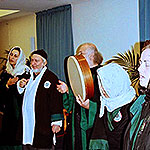Sufi Practices
The Sufi’s goal is to have an intimate and loving relationship with Allah. Over the centuries techniques have been developed to help the Sufi focus keenly on the goal and steer away from the many distractions that may cloud this relationship. These are the methods of tasawwuf (known in the West as Sufism), which are designed to take the murid (student) through the levels of nafs (egoistic or animalistic nature), thereby cleaning the obstruction from the spiritual heart, which is the place of connection between Allah and the human being.
The Sufi initiate is placed under the spiritual guidance and care of his or her shaykh or shaykha in a mutual pact called biat. It is essential that the shaykh have a personal and continuous relationship with his student, because at the moment of biat, the shaykh places him in a special curriculum, custom-designed to fit his individual spiritual needs. This is called suluk, the murid’s own particular road to Allah, which is regularly monitored by his shaykh.


The outer aspect of suluk is the totality of the experiences he will undergo in life, all of which will carry lessons for him to learn and tests by which he will be tried. For example, it may happen that he gets stuck in the same troublesome situation repeatedly. For the murid, this should be taken as a clue to the fact that there is some lesson that he hasn’t quite grasped. If he decides to leave the situation rather than change the thing in himself which gave rise to it, the pattern will repeat itself, until he gets the message and acts upon it. Everything in his world acts as a mirror to him. He will continue to see himself reflected back until he learns to get out of the way, at which point he sees the reality of Allah reflected in all things.
In suluk the murid learns that everything in the outer world has its inner aspect. In other words, everything is a sign from, and pointing to, Allah. Though he may encounter some strange or miraculous occurences, the salik, seeker, learns to regard such incidences as normal episodes in his Sufi trek through life. As he becomes more alert in his broadened scope of observation, his life becomes a Sufi story. This expanded perceptiveness helps to promote the realization that the realms of spiritual and material reality are not mutually exclusive.

Please note that the use of the masculine pronouns in some of these writings is purely for convenience. The Sufi path is open to women and men alike. Likewise, there is no gender implication in the Arabic name "Allah."
Many of the topics in this section of the website are excerpts from the book The Sun Will Rise in The West by Shaykh Taner Ansari. This book is recommended to readers for a detailed and comprehensive explanation of Sufism that is especially tailored to the Western mindset.








